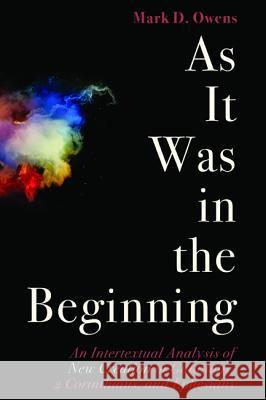As It Was in the Beginning » książka
As It Was in the Beginning
ISBN-13: 9781498202404 / Angielski / Miękka / 2015 / 260 str.
As It Was in the Beginning
ISBN-13: 9781498202404 / Angielski / Miękka / 2015 / 260 str.
(netto: 143,86 VAT: 5%)
Najniższa cena z 30 dni: 149,00
ok. 16-18 dni roboczych.
Darmowa dostawa!
Paul's comments regarding the new creation in 2 Cor 5:17 and Gal 6:15 have tended to be understood somewhat myopically. Some argue the phrase ""new creation"" solely refers to the inward transformation believers have experienced through faith in Jesus Christ. Others argue this phrase should be understood cosmologically and linked with Isaiah's ""new heavens and new earth."" Still others advocate an ecclesiological interpretation of this phrase that views Paul referring to the new community formed around Jesus Christ. In As It Was in the Beginning, Mark Owens argues that the concept of ""new creation"" should be understood (like the gospel) within the realm of Paul's anthropology, cosmology, and ecclesiology. At the same time, he also argues that Paul's understanding of new creation belongs within an Urzeit-Endzeit typological framework, especially within 2 Cor 5-6 and Eph 1-2. This reading of new creation attempts to give due weight to the use of Isaianic traditions in 2 Cor 5:17 and Eph 2:13, 17. Owens demonstrates that the vision of new creation in 2 Corinthians and Galatians is starkly similar to that of Ephesians. ""Dr. Owens has given us an excellent example of a thoughtful and careful investigation of Old Testament (and Second Temple) texts for the interpretation of the New Testament. Working especially with Isaiah's 'new exodus' theme, he has shown that a simplistic understanding of the 'new creation' theme in the epistles cannot be supported. His study of the Old Testament materials is exemplary in its balance, its evenhandedness, its restraint, and its fruitful results."" --John N. Oswalt, Visiting Distinguished Professor of Old Testament, Asbury Theological Seminary ""I have wondered about 'new creation' in Paul and I was intrigued by a study that works with the thesis that Paul 'would have read and interpreted Isaiah as a unified whole.' Dr. Owens follows the trajectory of passages in Isaiah 40-66 in a sure-footed fashion, illumines the texts he studies, and opened my eyes helpfully to the issues involved in studying the Pauline texts about new creation."" --John Goldingay, Professor of Old Testament, Fuller Theological Seminary, Pasadena, California ""In this well-conducted study of 'new creation' in Pauline literature (including Ephesians), Mark Owens argues persuasively that the Pauline theme, derived from Isaiah, has a wide reach, embracing the anthropological, ecclesiological and cosmological dimensions of the Christ event. This is a thorough and perceptive treatment of an important topic, and I highly recommend it."" --Edward Adams, Professor of New Testament Studies, Senior Tutor, Faculty of Arts and Humanities, Department of Theology and Religious Studies, King's College London Mark Owens (PhD, University of Aberdeen) is Assistant Professor of New Testament at Luther Rice College & Seminary.
Pauls comments regarding the new creation in 2 Cor 5:17 and Gal 6:15 have tended to be understood somewhat myopically. Some argue the phrase ""new creation"" solely refers to the inward transformation believers have experienced through faith in Jesus Christ. Others argue this phrase should be understood cosmologically and linked with Isaiahs ""new heavens and new earth."" Still others advocate an ecclesiological interpretation of this phrase that views Paul referring to the new community formed around Jesus Christ. In As It Was in the Beginning, Mark Owens argues that the concept of ""new creation"" should be understood (like the gospel) within the realm of Pauls anthropology, cosmology, and ecclesiology. At the same time, he also argues that Pauls understanding of new creation belongs within an Urzeit-Endzeit typological framework, especially within 2 Cor 5-6 and Eph 1-2. This reading of new creation attempts to give due weight to the use of Isaianic traditions in 2 Cor 5:17 and Eph 2:13, 17. Owens demonstrates that the vision of new creation in 2 Corinthians and Galatians is starkly similar to that of Ephesians.""Dr. Owens has given us an excellent example of a thoughtful and careful investigation of Old Testament (and Second Temple) texts for the interpretation of the New Testament. Working especially with Isaiahs new exodus theme, he has shown that a simplistic understanding of the new creation theme in the epistles cannot be supported. His study of the Old Testament materials is exemplary in its balance, its evenhandedness, its restraint, and its fruitful results.""--John N. Oswalt, Visiting Distinguished Professor of Old Testament, Asbury Theological Seminary""I have wondered about new creation in Paul and I was intrigued by a study that works with the thesis that Paul would have read and interpreted Isaiah as a unified whole. Dr. Owens follows the trajectory of passages in Isaiah 40-66 in a sure-footed fashion, illumines the texts he studies, and opened my eyes helpfully to the issues involved in studying the Pauline texts about new creation.""--John Goldingay, Professor of Old Testament, Fuller Theological Seminary, Pasadena, California""In this well-conducted study of new creation in Pauline literature (including Ephesians), Mark Owens argues persuasively that the Pauline theme, derived from Isaiah, has a wide reach, embracing the anthropological, ecclesiological and cosmological dimensions of the Christ event. This is a thorough and perceptive treatment of an important topic, and I highly recommend it."" --Edward Adams, Professor of New Testament Studies, Senior Tutor, Faculty of Arts and Humanities, Department of Theology and Religious Studies, Kings College LondonMark Owens (PhD, University of Aberdeen) is Assistant Professor of New Testament at Luther Rice College & Seminary.











